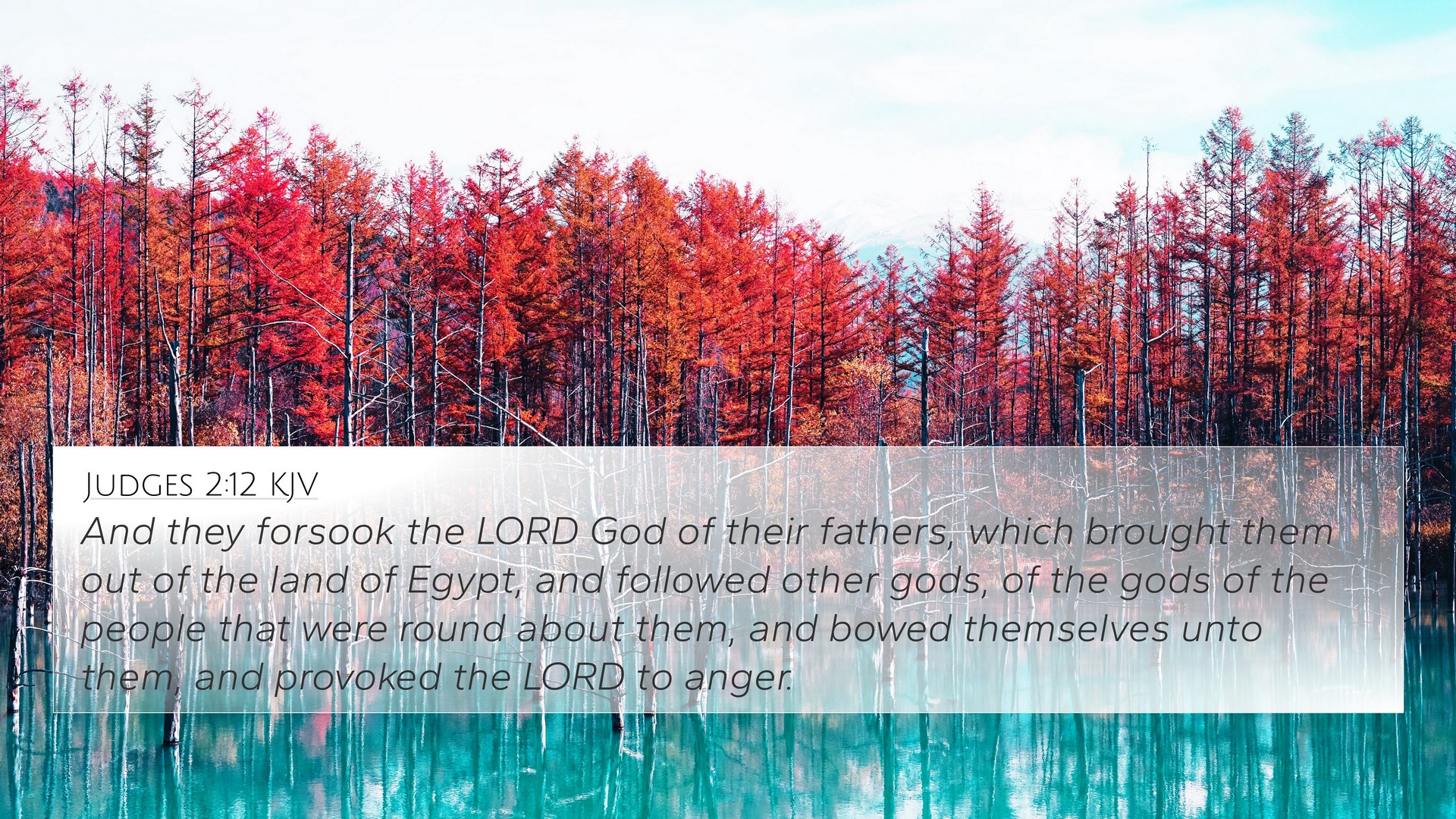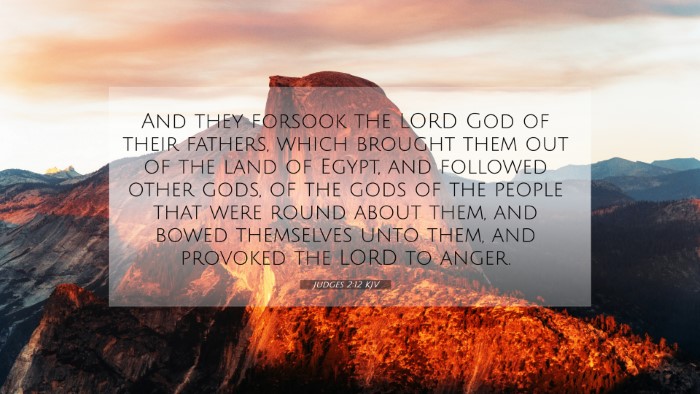Old Testament
Genesis Exodus Leviticus Numbers Deuteronomy Joshua Judges Ruth 1 Samuel 2 Samuel 1 Kings 2 Kings 1 Chronicles 2 Chronicles Ezra Nehemiah Esther Job Psalms Proverbs Ecclesiastes Song of Solomon Isaiah Jeremiah Lamentations Ezekiel Daniel Hosea Joel Amos Obadiah Jonah Micah Nahum Habakkuk Zephaniah Haggai Zechariah MalachiJudges 2:12 Similar Verses
Judges 2:12 Cross References
And they forsook the LORD God of their fathers, which brought them out of the land of Egypt, and followed other gods, of the gods of the people that were round about them, and bowed themselves unto them, and provoked the LORD to anger.
Uncover the Rich Themes and Topics of This Bible Verse
Listed below are the Bible themes associated with Judges 2:12. We invite you to explore each theme to gain deeper insights into the Scriptures.
Judges 2:12 Cross Reference Verses
This section features a detailed cross-reference designed to enrich your understanding of the Scriptures. Below, you will find carefully selected verses that echo the themes and teachings related to Judges 2:12 KJV. Click on any image to explore detailed analyses of related Bible verses and uncover deeper theological insights.
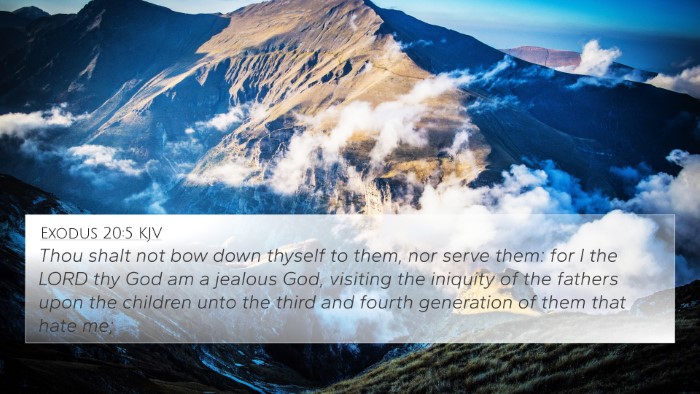
Exodus 20:5 (KJV) »
Thou shalt not bow down thyself to them, nor serve them: for I the LORD thy God am a jealous God, visiting the iniquity of the fathers upon the children unto the third and fourth generation of them that hate me;

Deuteronomy 29:18 (KJV) »
Lest there should be among you man, or woman, or family, or tribe, whose heart turneth away this day from the LORD our God, to go and serve the gods of these nations; lest there should be among you a root that beareth gall and wormwood;

Deuteronomy 6:14 (KJV) »
Ye shall not go after other gods, of the gods of the people which are round about you;
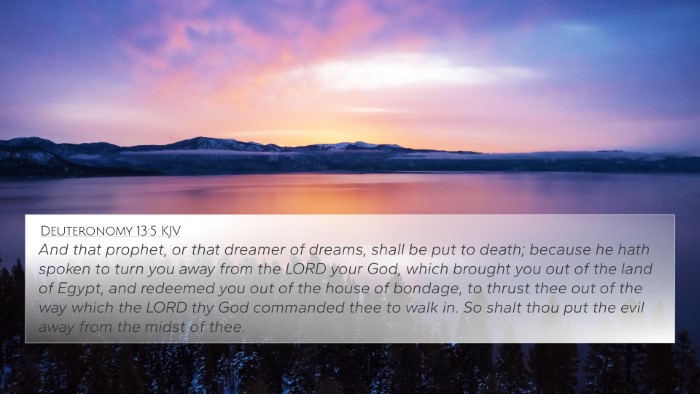
Deuteronomy 13:5 (KJV) »
And that prophet, or that dreamer of dreams, shall be put to death; because he hath spoken to turn you away from the LORD your God, which brought you out of the land of Egypt, and redeemed you out of the house of bondage, to thrust thee out of the way which the LORD thy God commanded thee to walk in. So shalt thou put the evil away from the midst of thee.
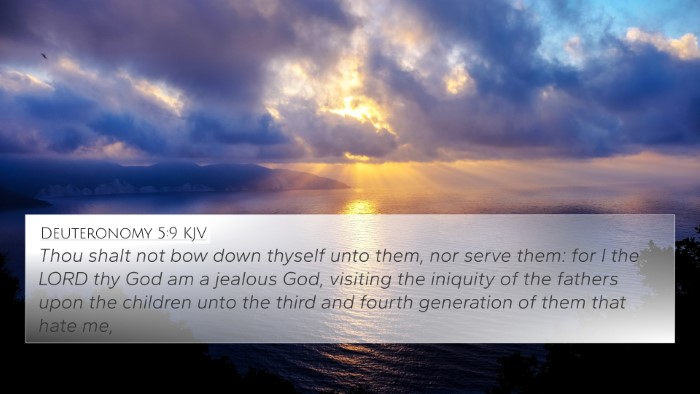
Deuteronomy 5:9 (KJV) »
Thou shalt not bow down thyself unto them, nor serve them: for I the LORD thy God am a jealous God, visiting the iniquity of the fathers upon the children unto the third and fourth generation of them that hate me,
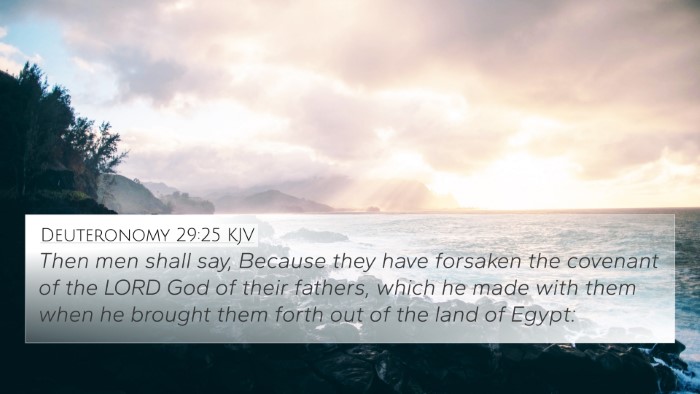
Deuteronomy 29:25 (KJV) »
Then men shall say, Because they have forsaken the covenant of the LORD God of their fathers, which he made with them when he brought them forth out of the land of Egypt:
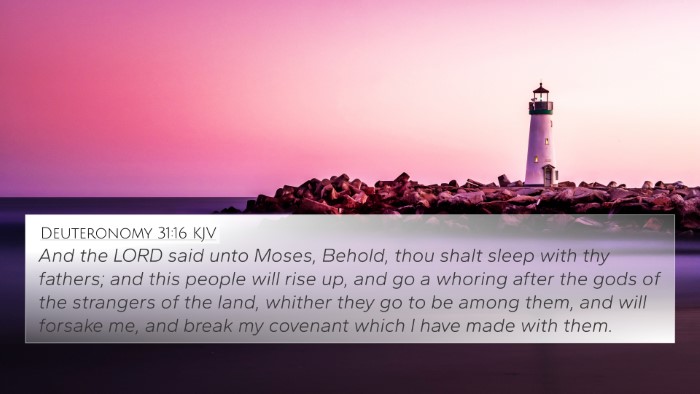
Deuteronomy 31:16 (KJV) »
And the LORD said unto Moses, Behold, thou shalt sleep with thy fathers; and this people will rise up, and go a whoring after the gods of the strangers of the land, whither they go to be among them, and will forsake me, and break my covenant which I have made with them.

Deuteronomy 32:15 (KJV) »
But Jeshurun waxed fat, and kicked: thou art waxen fat, thou art grown thick, thou art covered with fatness; then he forsook God which made him, and lightly esteemed the Rock of his salvation.
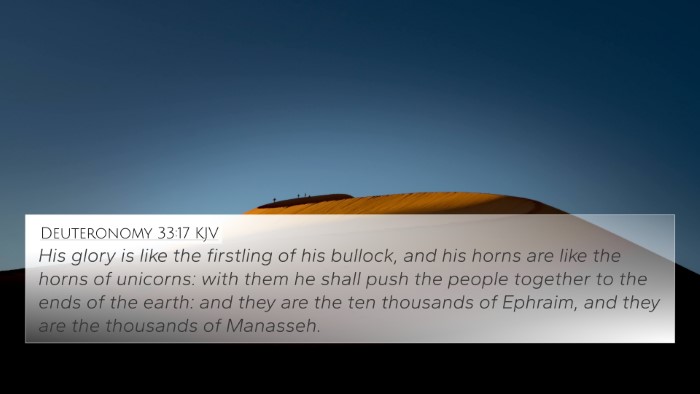
Deuteronomy 33:17 (KJV) »
His glory is like the firstling of his bullock, and his horns are like the horns of unicorns: with them he shall push the people together to the ends of the earth: and they are the ten thousands of Ephraim, and they are the thousands of Manasseh.

Judges 5:8 (KJV) »
They chose new gods; then was war in the gates: was there a shield or spear seen among forty thousand in Israel?
Judges 2:12 Verse Analysis and Similar Verses
Understanding Judges 2:12
Judges 2:12: "And they forsook the Lord God of their fathers, which brought them out of the land of Egypt, and followed other gods, of the gods of the people that were round about them, and bowed themselves unto them, and provoked the Lord to anger."
This verse succinctly captures a pivotal moment in the history of Israel, emphasizing the pattern of disobedience that led to God's displeasure. The commentary insights from prominent theologians such as Matthew Henry, Adam Clarke, and Albert Barnes illuminate the depth of this scripture.
Summary of Biblical Commentary Insights
- Matthew Henry: He notes that this verse highlights the susceptibility of the Israelites to idolatry, despite their experience of God's deliverance. He emphasizes the importance of remembering one's covenant with God and warns against the dangers of following the practices of surrounding nations.
- Albert Barnes: Barnes underscores the seriousness of forsaking God, pointing out that it was not just a choice to worship foreign gods, but a blatant rejection of the God who liberated them from slavery. He elucidates the psychological and spiritual implications of their actions, viewing this as a breach of trust and commitment.
- Adam Clarke: Clarke elaborates on the 'gods of the people' which represents a collective moral failure. He suggests that this verse serves as a stark reminder of the conditional nature of divine favor and the consequences of turning away from God.
Thematic Connections
The verse can be linked to several vital themes found throughout Scripture, which reflect the ongoing struggle between fidelity to God and the temptation to conform to surrounding cultures.
- Idolatry and Apostasy: Judges 2:12 is emblematic of a broader biblical theme regarding idolatry, a recurring issue in the Biblical narrative. This draws parallels with Exodus 32, where the Israelites construct a golden calf, demonstrating a pattern of quickly forsaking God.
- God’s Faithfulness versus Human Betrayal: This theme can be seen in Psalms 78:57, where the unfaithfulness of Israel is contrasted with God's enduring commitment to His people.
- The Call to Remember: Deuteronomy 6:12 warns against forgetting God after experiencing His blessings, reinforcing the idea present in Judges 2:12 that forgetting leads to spiritual decline.
- Divine Justice: The response of God's anger is laid out in Jeremiah 2:13, where the forsaking of the living God for broken cisterns is addressed, showing the continuity of God's response to human failure.
- Consequences of Disobedience: Leviticus 26:30 warns of destruction for idolatry and forsaking God, related to the outcomes faced by Israel each time they turned from Him.
- Covenant Relationships: The concept of the covenant in terms of loyalty is a significant theme discussed throughout Scripture, as captured in the negative aspect reflected in Judges 2:12, which is similar to James 4:4 condemning friendship with the world.
- Warnings Against Cultural Assimilation: The repeated warnings found in 1 John 2:15-17 echo the dangers that Judges warns against, where attachment to worldly desires leads away from God.
Bible Cross References
To deepen understanding, one may explore various cross-references that relate directly to Judges 2:12:
- Exodus 20:3-5: The commandment against idolatry reinforces God’s expectations of loyalty.
- Deuteronomy 8:19: A reminder of the consequences of forgetting God.
- Psalms 106:21-22: A poetic reflection on Israel’s ingratitude.
- Jeremiah 7:18: Addresses the practice of worshiping other gods traditionally.
- Hosea 4:6: Highlights the destruction from lack of knowledge of God.
- Matthew 6:24: "No man can serve two masters" emphasizes loyalty.
- Revelation 2:4-5: This passage warns the churches against losing their first love for Christ.
Conclusion
Judges 2:12 not only forms a narrative history but also serves as a profound theological lesson about the perennial struggle between fidelity to God and the allure of the world. By interpreting this verse through various commentaries, we observe a robust framework that can facilitate a deeper understanding of scripture.
Utilizing tools for Bible cross-referencing can enhance one's study, allowing for richer insights as one notes the connections between this verse and the broader biblical themes. Indeed, the call for faithfulness, the consequences of idolatry, and the need for remembrance are threads interwoven throughout Scripture, urging believers to a life committed to God.
